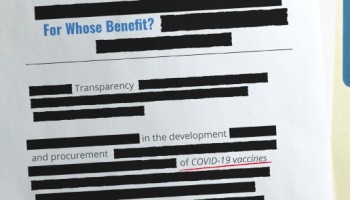The COVID-19 pandemic has in less than a year infected more than 55 million people and has killed more than 1.3 million worldwide. It has devastated economies and driven entire industries almost into bankruptcy.
“High demand combined with a limited supply will make COVID-19 vaccines the equivalent of liquid gold to organized crime networks as soon as one is available,” Interpol Secretary General, Jürgen Stock, said.
Transparency International also warned that vaccines could become a new weapon in the hands of powerful states, which may use them to “wield geopolitical influence,” but in the hands of criminals as well.
“Whilst most vaccines have little street value, initial limited supplies of a COVID-19 vaccine — compounded by a likely high demand from anxious populations — will make it a target for theft and diversion,” head of Major Projects at TI Health Initiative, Jonathan Cushing, wrote in an opinion piece.
Cushing also said that transparency is the key to equitable distribution and that it can ensure that access, or lack of access to the vaccine “is not used to the detriment of marginalized populations, or to foster political patronage.”
He stressed that besides technical assistance to lower-income countries, such as cold-chain fridges necessary to store the vaccines until their application, campaigns should be organized to “make communities aware of the dangers posed by black market or illegal sales, and the introduction of corruption reporting hotlines.”
The Interpol chief also stressed that “it is essential for action to be taken now, to both protect the legitimate supply chain for when the vaccine is ready, and to prevent the production and distribution of fake COVID-19 vaccines.”
Interpol warned that vaccines could become another piece of the puzzle of criminal activities linked to the pandemic. The agency therefore updated its guidelines to “help police identify and address crimes impacted by COVID-19, including domestic violence, child abuse and cybercrime.”
The guidelines also include recommendations related to deliberate contamination, public order, fraud and money laundering. Those recommendations must be in line with applicable human rights standards, national legislation, policing best practices and in coordination with national public health authorities.
“As the global COVID-19 situation continues to evolve, so must the law enforcement response and these updated guidelines provide a useful reference document for frontline officers to protect themselves and the communities they serve,” Interpol head, Jürgen Stock, concluded.






